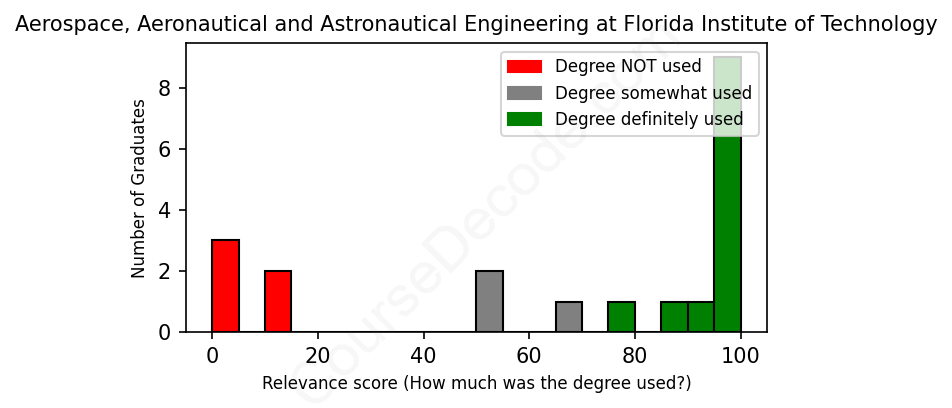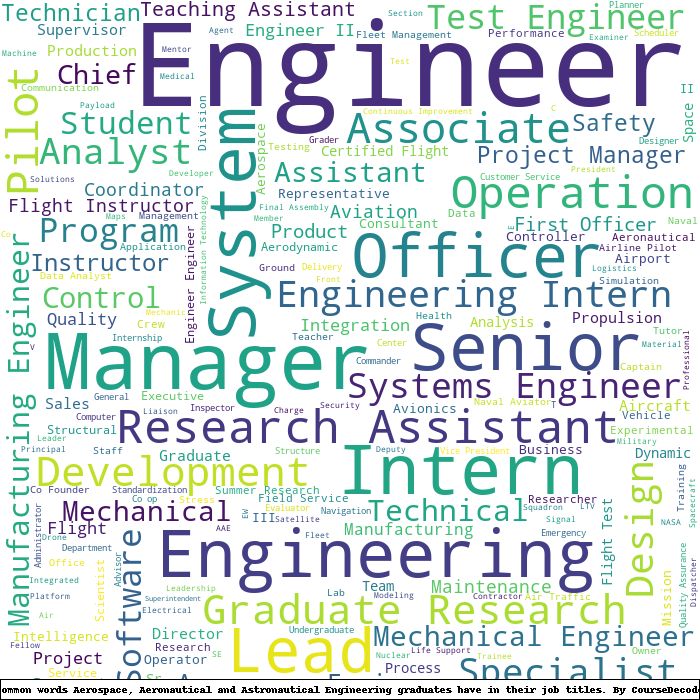
First, some facts. Of the Aerospace, Aeronautical and Astronautical Engineering graduates from Florida Institute of Technology we've analyzed , here's how many have used (or NOT used) their degree in their career:

These are estimates based on AI analysis of 20 LinkedIn profiles (see below).
The verdict? On par with the average. Overall, with an average relevance score of 67%, Aerospace, Aeronautical and Astronautical Engineering graduates from Florida Institute of Technology have about the same likelihood of finding work in this field as the average graduate across all fields:
And for comparison, here's the chart for all profiles we've looked at across all degrees.
Also, after graduating, only 30% of these graduates have pursued further education other than another Bachelor's degree (such as a Masters degree or other), compared to the average across all profiles of 35%. This suggests a Bachelors degree is enough for most Aerospace, Aeronautical and Astronautical Engineering graduates, and it's normal to look for work straight after graduation.
See the details:
|
Relevance score: 65% We think this person has gone into a career only somewhat relevant to their degree. We think this person has gone into a career only somewhat relevant to their degree.
DEGREE INFOGraduated in 2020 from Florida Institute of Technology with a Bachelors Degree in Aerospace, Aeronautical and Astronautical Engineering. No other secondary education since. JOB HISTORY SINCE GRADUATIONMechanical Engineer A.V.W. Equipment Company, Inc. Sep 2020 - Jan 2022 Metrology Engineer  Joby Aviation Jan 2022 - Dec 2023 Tooling Design Engineer  Joby Aviation Jan 2024 - Present ABOUTNo information provided. |
The top 10 most common jobs done by the graduates we've analyzed (ranked most common to least) are:
When looking at the career paths of graduates from the Florida Institute of Technology with degrees in Aerospace, Aeronautical, and Astronautical Engineering, it’s clear that a significant number of them have landed roles that are highly aligned with their academic background. Common job titles include Flight Test Engineer, Spacecraft Controller, and various engineering roles at major companies like Boeing, NASA, and Lockheed Martin, where they utilize the aerospace principles they learned in school. This shows that for many, their education is directly applicable to their jobs, allowing them to work on projects that involve aircraft systems, spacecraft operations, and other aerospace-related tasks.
However, it’s also evident that not all graduates ended up in roles related to aerospace engineering. Some took jobs in areas like retail, IT support, or consulting, which do not apply the skills from their degree. For instance, roles like Front Office Coordinator or Securities Trader are far removed from the technical field of aerospace. So, while a good chunk of graduates are successfully applying their knowledge in relevant positions, there’s also a notable number who veered off into unrelated careers. This mix suggests that while an aerospace degree can open doors to specialized fields, the job market's diversity still allows for a wide range of career options, even if they aren’t directly tied to aerospace engineering.
Here is a visual representation of the most common words in job titles for Aerospace, Aeronautical and Astronautical Engineering graduates (this is across all Aerospace, Aeronautical and Astronautical Engineering graduates we've analyzed, not just those who went to Florida Institute of Technology):

Graduates from Florida Institute of Technology with degrees in Aerospace, Aeronautical, and Astronautical Engineering have had a mix of career trajectories that reflect both successful employment in relevant fields and a few deviations into unrelated jobs. For many, the first jobs after graduation often align closely with their studies. Positions such as Flight Test Engineer, System Engineer, and various roles at aerospace giants like Boeing and NASA dominate the early career landscape, providing a strong foundation for those looking to advance in aerospace or related sectors. It’s clear that many graduates have been able to secure roles that utilize their technical skills in a directly applicable manner, showcasing the Institute's solid reputation in the engineering community.
However, there's also a notable number of graduates who have ventured into less industry-specific roles or entirely different fields a few years post-graduation. For example, some are found in management, finance, or even hospitality, which suggests a diversification in career paths that might not always align with their aerospace engineering background. As they progress five to ten years later, many do find their way back into relevant roles, taking on positions such as Mechanical Engineer or Specialists in aerospace operations. Overall, the trajectory appears promising for those who stick with their field, while others may find alternative career paths that offer different opportunities for growth and satisfaction.
Pursuing a Bachelor’s degree in Aerospace, Aeronautical, or Astronautical Engineering is definitely on the challenging side, especially at a school like Florida Institute of Technology, which has a solid reputation in the field. You'll dive into complex subjects like fluid dynamics, propulsion, and materials science, and expect a hefty workload with a lot of math and physics. It’s probably tougher than your average degree because you’ll need to grasp some pretty intense concepts and apply them to real-world problems. That said, if you're passionate about aircraft, space, and all things aerospace, the challenges can be totally worth it. Just be ready to hit the books hard and stay organized!
Most commonly, in the LinkedIn profiles we've looked at, it takes people 4 years to finish a Bachelor degree in Aerospace, Aeronautical and Astronautical Engineering.
Looking at these graduates from the Florida Institute of Technology, it seems that most of them have landed decent jobs in aerospace, aeronautical, or astronautical roles, particularly ones that generally pay well. For instance, a lot of the early 2010 grads have moved through significant engineering positions at big names like Boeing and NASA, which is a good sign of a solid income. However, there are some outliers—like the 2010 grad who worked as a store associate right after college. Overall, while not everyone is raking in the big bucks right off the bat, many have established careers in high-paying fields and moved up in their respective companies, suggesting they’re on a good financial path. So, yeah, it looks like a lot of them are likely making decent money as they climb the ladder in their careers!
Here is a visual representation of the most common words seen in the "about" section of LinkedIn profiles who have a Bachelor degree in Aerospace, Aeronautical and Astronautical Engineering (this is across all Aerospace, Aeronautical and Astronautical Engineering graduates we've analyzed, not just those who went to Florida Institute of Technology). This may or may not be useful:

Here are all colleges offering a Bachelor degree in Aerospace, Aeronautical and Astronautical Engineering (ordered by the average relevance score of their Aerospace, Aeronautical and Astronautical Engineering graduates, best to worst) where we have analyzed at least 10 of their graduates:
| College | Score | Count |
|---|---|---|
 Texas A&M University Texas A&M University
|
87 | 22 |
 California Polytechnic State University-San Luis Obispo California Polytechnic State University-San Luis Obispo
|
86 | 12 |
 University of Cincinnati University of Cincinnati
|
86 | 10 |
 Purdue University Purdue University
|
85 | 40 |
 Rensselaer Polytechnic Institute Rensselaer Polytechnic Institute
|
85 | 17 |
 Georgia Institute of Technology Georgia Institute of Technology
|
84 | 23 |
 Liberty University Liberty University
|
81 | 21 |
 Iowa State University Iowa State University
|
80 | 16 |
 University of Colorado Boulder University of Colorado Boulder
|
80 | 13 |
 California State Polytechnic University-Pomona California State Polytechnic University-Pomona
|
79 | 13 |
 United States Naval Academy United States Naval Academy
|
77 | 12 |
 The Ohio State University The Ohio State University
|
76 | 20 |
 University of Central Florida University of Central Florida
|
75 | 25 |
 Arizona State University Arizona State University
|
74 | 12 |
 University of Michigan University of Michigan
|
74 | 10 |
 Embry-Riddle Aeronautical University Embry-Riddle Aeronautical University
|
71 | 163 |
 Penn State University Penn State University
|
68 | 12 |
 Florida Institute of Technology Florida Institute of Technology
|
67 | 20 |
 The University of Alabama in Huntsville The University of Alabama in Huntsville
|
67 | 11 |
 Embry Riddle Aeronautical University-Worldwide Embry Riddle Aeronautical University-Worldwide
|
66 | 10 |
 University of Illinois at Urbana-Champaign University of Illinois at Urbana-Champaign
|
48 | 10 |